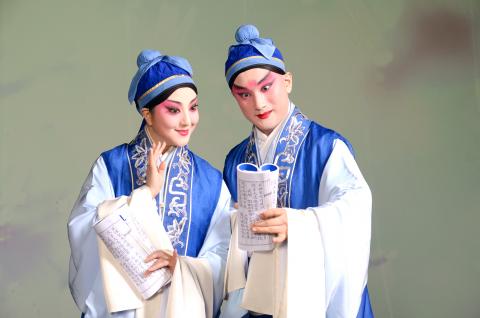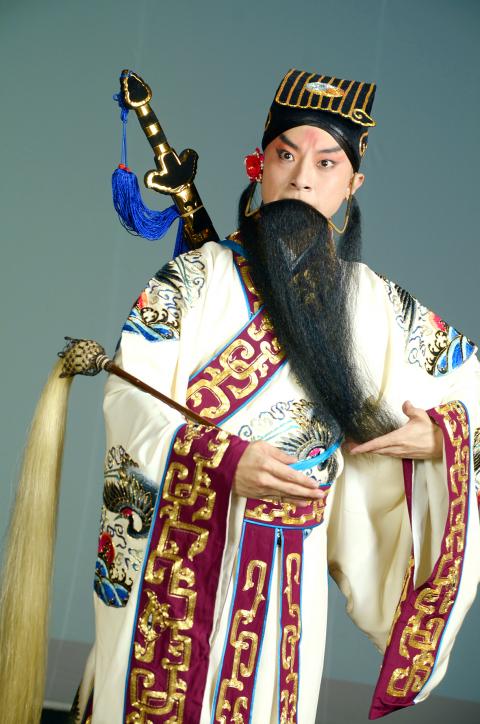The National Guoguang Opera Company (國立國光劇團) is closing the lunar year with a showcase that includes a production of the modern kun opera (崑劇) The Butterfly Lovers (梁祝), starring Wen Yuhang (溫宇航), an important addition to the company’s lineup, and a Beijing opera double bill featuring rising star Sheng Jian (盛鑑).
In 2001, kun opera was listed as a Masterpiece of the Oral and Intangible Heritage of Humanity by UNESCO. The art form is often referred to as “the mother of Chinese opera” (百戲之母), but for a range of historical reasons it has long been in danger of being swamped by other forms of opera, including brash and brassy Beijing opera (heavily supported by the Chinese government as the “national opera”), and regional favorites like gezai (歌仔) opera (strongly supported by localizing elements in the ROC government).
With increased international recognition of its importance, the beleaguered forces of kun opera have regrouped and are fighting back fiercely for a place in the limelight [see Taipei Times Aug. 4, 2011, “‘Kun’ opera finds new life in Taiwan”].

Photo Courtesy of National Guoguang Opera Company
In Taiwan, a notable achievement for kun opera has been the appointment of Wen Yuhang as a full-time member of the National Guoguang Opera Company.
According to Yu Ting-ting (游庭婷), an assistant researcher at Guoguang, kun opera has always been part of the basic training of the Beijing opera performers at the company, but the addition of Wen has provided a greater depth of knowledge of the genre’s finer points.
Yu added that Cai Zhengren (蔡正仁), the director of the Shanghai Kun Opera Company (上海昆劇團), recently suggested that Guoguang should become a combined Beijing and kun opera company, and while this direction is something the company might pursue in the long term, any talk of substantive action is premature.

Photo Courtesy of National Guoguang Opera Company
All the same, that Guoguang is putting on a full-blown kun production indicates the importance it places on the revival of this ancient form of Chinese opera.
The Butterfly Lovers is a folk story that has been incorporated into numerous operatic forms. Widely regarded as the Romeo and Juliet of classical Chinese theater, it tells the tale of the impecunious scholar Liang Shanbo (梁山伯) and the rich and impetuous young woman Zhu Yingtai (祝英台). Despite its popularity, and its presentation in a wide variety of regional operatic styles, the story was not adapted for kun opera until 2004, when a production was commissioned by Guoguang and performed by kun enthusiasts from local theater schools and opera companies.
“There is no comparison in regard to the virtuosity of the lead performers,” Yu said about this new production, which in addition to Wen, stars Wei Chunrong (魏春榮), a leading light of the Shanghai Kun Opera Company. Wei is already well-known to Taiwan audiences after receiving an ecstatic reception for her role as the imperial consort Yang Yuhuan (楊玉環) in the 2010 kun opera production of The Palace of Eternal Youth (長生殿).
“The lead performers are both specialists in kun opera and are at the height of their powers,” Yu said. “Their command of voice and movement is incomparable.”
Scriptwriter Tseng Yong-yih (曾永義) has made some changes to the usual operatic presentation of the story. He has emphasized the romantic elements of the often heavily moralizing tone of the original story, and given greater expressive scope to the female lead.
According to Yu, a new scene in which Zhu openly disobeys her father and contemplates eloping with her lover has been added, making the female lead a more determined and active character. Toward the end, a dream sequence has been inserted, providing an alternative happy ending prior to the inevitable tragedy.
Unfortunately for non-Chinese speaking audiences, there will be no English subtitles nor abstract available for this production.
“With new productions, we usually provide at least an abstract,” Yu said, “as people may not be familiar with the story. But The Butterfly Lovers is so well known, we never really thought about it.”
Still, Guoguang is not entirely ignorant of growing international interest in Chinese opera. A new Beijing opera based on Shakespeare’s Cleopatra, starring Wei Hai-min (魏海敏) and scheduled to open in March, will have complete English subtitles, said Yu.
The season ends on Sunday with a double bill of Beijing opera starring Sheng Jian, a performer who made his name in contemporary Chinese opera. As The Eight Immortals Cross the Eastern Sea (八仙過海) and Vengeance in a Black Pot (奇冤報) are both very traditional shows, this will be a chance for him to show fans that his acting chops are not all modern frou-frou, and that he has a solid foundation of traditional skills.
ditional skills.

June 9 to June 15 A photo of two men riding trendy high-wheel Penny-Farthing bicycles past a Qing Dynasty gate aptly captures the essence of Taipei in 1897 — a newly colonized city on the cusp of great change. The Japanese began making significant modifications to the cityscape in 1899, tearing down Qing-era structures, widening boulevards and installing Western-style infrastructure and buildings. The photographer, Minosuke Imamura, only spent a year in Taiwan as a cartographer for the governor-general’s office, but he left behind a treasure trove of 130 images showing life at the onset of Japanese rule, spanning July 1897 to

In an interview posted online by United Daily News (UDN) on May 26, current Chinese Nationalist Party (KMT) Chairman Eric Chu (朱立倫) was asked about Taichung Mayor Lu Shiow-yen (盧秀燕) replacing him as party chair. Though not yet officially running, by the customs of Taiwan politics, Lu has been signalling she is both running for party chair and to be the party’s 2028 presidential candidate. She told an international media outlet that she was considering a run. She also gave a speech in Keelung on national priorities and foreign affairs. For details, see the May 23 edition of this column,

One of the most important gripes that Taiwanese have about the Democratic Progressive Party (DPP) is that it has failed to deliver concretely on higher wages, housing prices and other bread-and-butter issues. The parallel complaint is that the DPP cares only about glamor issues, such as removing markers of Chinese Nationalist Party (KMT) colonialism by renaming them, or what the KMT codes as “de-Sinification.” Once again, as a critical election looms, the DPP is presenting evidence for that charge. The KMT was quick to jump on the recent proposal of the Ministry of the Interior (MOI) to rename roads that symbolize

Jade Mountain (玉山) — Taiwan’s highest peak — is the ultimate goal for those attempting a through-hike of the Mountains to Sea National Greenway (山海圳國家綠道), and that’s precisely where we’re headed in this final installment of a quartet of articles covering the Greenway. Picking up the trail at the Tsou tribal villages of Dabang and Tefuye, it’s worth stocking up on provisions before setting off, since — aside from the scant offerings available on the mountain’s Dongpu Lodge (東埔山莊) and Paiyun Lodge’s (排雲山莊) meal service — there’s nowhere to get food from here on out. TEFUYE HISTORIC TRAIL The journey recommences with